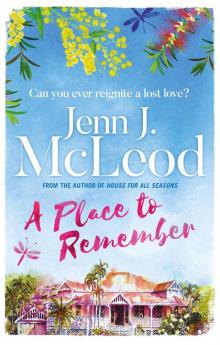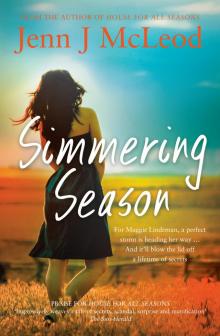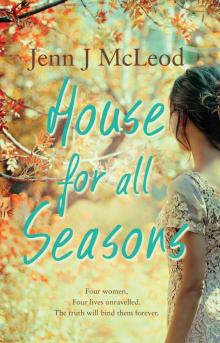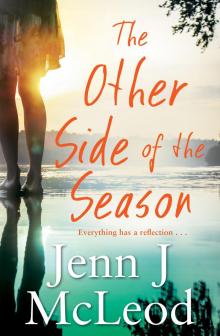- Home
- Jenn J. McLeod
Other Side of the Season Page 20
Other Side of the Season Read online
Page 20
‘I thought we might spend some time together tonight.’
‘Of course, yes. You do what you have to do. I’m sure you’ll want to shower. Then come back here. We can talk for a while. Tea and bikkies perhaps, as I’m not all that hungry. Then you should get a good night’s sleep–in a bed for a change. You’re looking a little peaked. You need to take more care.’ Natalie smiled and dabbed a tear from Sid’s cheek before tucking a loose strand of hair behind her daughter’s ear. ‘Everything will work out. We’ll all be fine, just fine.’
Mother and daughter hugged awkwardly, before Natalie pulled back and sent Sidney on her way.
Nat could picture her daughter’s route to the bottom of the mountain, along the very same road Tilly had ridden her bike, at speed, with David in pursuit. The image and the memory made her too tense for a lie-down. Instead she’d take a stroll around the shops and wait for her daughter’s return. Maybe she’d buy something from the bakery on her way back to the villa. Sidney needed to eat, even if she didn’t.
• • •
The first place to grab Natalie’s attention was the volunteer-run arts and craft gift shop that doubled as a tourist information outlet. What had once been the creepy old doctor’s surgery was now a store crammed with shelves and all manner of cheesy, chintzy souvenirs. Sharing shelf space in the compact shop were crocheted bears, linen dolls and wooden signs painted with words like IMAGINE, DREAM, WISH, LOVE. Natalie was immediately drawn to the side wall and a collection of original paintings, appreciating both amateur and obviously accomplished pieces hanging side by side. Stopping on her way out to drop a five-dollar note in the donation box, Natalie noticed a flyer promoting an up-market B & B.
‘I’m afraid those brochures are old,’ the grey-haired lady behind the counter blustered, grabbing the remaining flyers before Natalie could read them and popping them out of sight. ‘The B & B is closed. I should have shifted them.’
‘I see.’ A wave of sadness washed over Nat at the thought of her own abandoned Brushstrokes in the Bush languishing empty, its future uncertain.
‘It was expected the place would reopen. We certainly hoped that would be the case,’ the woman explained. ‘We refer a lot of people there. But the young chappie who runs the B & B has had a tough time of late. Got his share of troubles, for sure. Nice enough fellow. Feel sorry for his most recent loss, even though most folk around here might not say the same. You can’t judge a boy by his father, can you?’
‘He’s young?’
‘Well, everyone’s young once you get to my age,’ the lady sniggered. ‘The lad certainly tried to make a go of the B & B. A bit flighty, though. Few people who are clever with their hands are equally as clever with their heads when it comes to running a business. Of course, I’m not saying anything I don’t know. Those four oil-on-canvas works you were admiring before are mine,’ she said proudly. ‘And I’m certainly no genius. Now, if you want a nice bush retreat to relax for a bit, there’s always–’
‘Thank you. I’m not looking to stay long. Only a night or two and I have a villa.’
‘Can I give you any local information, perhaps?’
Natalie was curious about the state of Greenhill–how Ted and Rose had coped after Matthew left, how rundown the place was now–but she was pretty sure that wasn’t the sort of local information the lady was offering. She toyed with the idea of asking how long Greenhill had been on the market, as the real-estate sign had been placed a little to the right of the Greenhill gate, not easily seen by passing motorists. Perhaps Natalie could ask if it was the Marhkts’ old property up for sale, and not Greenhill.
Had Natalie known she’d be back here, she might have taken more notice of the detail in the solicitor’s letter before throwing it in the bin. Her only thought at the time–after recovering from shock–was a kind of smug satisfaction that old Ted was in prison. He was getting his comeuppance, finally, after having been so mean to Matthew and so dismissive of her need to see David and say goodbye.
‘If you like your art, and you appear to have very good taste,’ the woman was saying, ‘you might want to drop by the other gallery in town.’
‘There’s more than one?’ Oh, thank goodness! For a while Natalie had thought this was her daughter’s idea of an amazing gallery.
‘Yes, dear. The Rose Gallery. It’s not far from here, although not walkable, unless you’re half mountain goat.’
Natalie forced a smile. ‘The Rose Gallery?’
‘Not as in flowers, not that I could blame you for thinking that. It’s named after the lady of the house.’
Natalie stifled a small gasp. ‘And there’s a gallery up there?’
‘Yes, that’s right. Rose started the gallery.’
‘Rose?’
‘Yes, a wonderful woman. She gave most of her life to the arts in one way or another. She was a very fine artist, and an extraordinarily gifted teacher. She used to hold classes for locals. Such fun times, especially when we got to study nudes.’ The woman’s cheeks flushed bright red. ‘Mind you, we were all a few years younger then and choofing off up that hill to workshops like a bunch of silly chooks.’ The woman tittered. ‘A lot of people credit that husband of hers with the growth of our little town, but Rose was the driving force behind the Hill family.’
‘And she’s alive?’ Natalie asked.
‘Sadly, no. She passed away. The service was fitting.’ The woman shook her head. ‘We all go eventually, I know, but poor Rose . . . So much tragedy in her life, too. That sad, sad business of losing a son.’
‘She lost a son?’
‘Terrible, terrible shame, and what a wonderful family they were before the accident. All that fuss and kerfuffle afterwards was . . . Well, it was one too many tragedies and such things eventually take their toll on the strongest of people.’
‘Tragedies, yes,’ Natalie mumbled, wondering if the woman had heard the regret in her voice. She’d liked Rose.
‘You’re visiting family around here?’ The old lady looked at her quizzically. ‘You look familiar.’
‘No, just one of those faces, I suspect.’ Get out of there, Natalie. ‘I’ll head off, now. Thank you for your time.’
‘Enjoy your stay in town. The breakwall is lovely today . . .’ The woman’s voice faded away the minute Natalie stepped outside into the sea breeze.
She hadn’t expected to be recognised, not for a minute. In her immaculately-cut caramel-coloured trousers and jacket she looked so different to that barefoot young girl with the wild hair and fresh face who’d skipped school and wreaked havoc around town wearing Hilda’s homemade dresses. Natalie was never seen in public these days without full make-up, hair straightened and sprayed in place, and a mirror to check for lipstick on her teeth. The old woman’s curious squint just now had rattled her, though, and she drew the sunglasses down off her head, repositioning them on her nose, then fussed at her bobbed blonde fringe that tipped tinted eyebrows.
For a winter’s day, the late afternoon sun still bore down hard and Nat felt squint lines forming around her eyes. She had her woollen cloche hat and matching scarf in her suitcase, but they were hardly practical. Next to the bric-a-brac store she found a pharmacy with assorted caps and straw panamas on a stand by the front door. Rather than full cover, she chose a sunvisor that wouldn’t mess with her hairdo. After paying the girl at the register, Nat crossed the street, nostalgia drawing her to the foreshore.
Like the sea now pounding the breakwall, Natalie’s recollections came crashing back. She could picture her younger self on this very spot, huddled on her haunches, the hem of her dress tucked under the elastic of her knickers so she could clamber to the ocean side of the breakwall. She was a child desperate to save the helpless marine treasures sheltering beneath the boulders. Did they not know the tide would come in and all the tiny creatures tucked high and dry and safe from predators would find themselves caught up in swirling water and swept out with the receding wave, forced to fend for themselves? Such were th
e perils of the sea, where the slightest turbulence could dislocate that which had remained undisturbed for decades.
Such were the perils of coming home!
Is that why she was back here? Was it time she let the tide come in and sweep out all those memories Natalie had thought were safe?
She examined the old breakwall that was now an open-air gallery–works of art mixed with exuberant graffiti. Some pieces were remarkable in their detail, others obviously spontaneous. The thought that she and David might have started such a craze made her breath catch in her chest. To think that what they’d once hidden away from the public for fear of censure was now a local attraction.
On the drive down, Sidney had been rambling excitedly about a series of sculptures for the breakwall, commissioned by the local council to mark the town’s upcoming centenary. Natalie saw three installations, the third one being uncovered by two men in fluoro work vests. A council work crew were putting the finishing touches on the ceremonial plaque while two other men–one wearing a shirt and tie, the other with his grey ponytail and baggy clothes fitting the artist stereotype–stood in conversation nearby. Such stereotypes were everywhere in the industry, but there was nothing typical about the three life-size effigies he’d created.
The first flat figure–feminine in shape–fashioned from a thin, mirror-like material, meant the work blended eerily into its surroundings, the reflection different depending on the observer’s perspective. In fact, Nat had barely noticed it until she was in close proximity.
Although clever, Nat felt uncomfortable about the artist’s choice of medium. Why reflect what’s behind a person? Wasn’t that simply looking back? Or was his purpose deeper, more symbolic? Was he challenging the observer to consider how we fit into our surroundings? Or, perhaps more importantly, the impact on our environment. Sid, the self-appointed recycle police, would like that. The opposite side of the reflective sculpture was neither glass nor mirror, but a delicate mosaic, painstakingly arranged into a quotation: It’s what you can’t see in a mirror that matters most. Credit to the author was on a small engraved plaque: Stephen Gray. Now intrigued, Natalie moved to the next installation. Another mirror, again in the shape of a person–the male–with another quote on the back: The world is a looking-glass, and gives back to every man the reflection of his own face.
‘William Makepeace Thackeray,’ she spoke aloud, not familiar with that person either, but approving of both the quote and his name. Making peace with herself and her daughter was Nat’s very thought. She’d start by finding Sidney and hugging her.
As she made to leave, something drew Natalie to look more closely at the final sculpture–different again, as this one was comprised of not one but two smaller figures–obviously children hand in hand. With the artist still engaged in conversation, Natalie took the opportunity to examine the third and final piece, wondering if the boy and girl were linked in some way to the adults. Was his message about family, or about reflecting on how we are born and grow and change? Natalie was excited about the possibilities. Interpreting art is what she enjoyed the most.
She circled the sculpture, observing how the reflection changed from shades of blue sea and sky to the multicoloured reflection of the rock art along the breakwall. Then she saw it . . . Sitting dead centre in the mirror . . . The blue and orange design that was etched like a tattoo on Natalie’s memory.
Our rock!
A small stagger backwards, another small shift in perspective, put her own reflection in the mirror sculpture side by side with that of a man standing behind her. Natalie froze, her arms hanging limp, her stare locked onto her hand and the man’s, both now together and mimicking the small hand-holding effigies. She was still managing to breathe, barely, until she looked up. The face might have been thirty-six years older, thinner, tired-looking, but it was his face.
33
Watercolour Cove, 2015
Where are you, Mum?
Sid wasn’t worried as much as she was annoyed. Hadn’t Natalie been keen to rest? As she neared the breakwall, Sid heard the collective gasp and saw the small surge of sightseers, with David among the melee. In the middle of the confusion was her mother and a young man in a wetsuit–the blond surfer from the garage–guiding Natalie to a park bench.
‘Let me help.’ Sid had slipped through the throng and taken her mother’s other arm. ‘What happened?’
‘One minute the lady’s admiring my work, the next she seemed to go weak in the knees,’ David replied.
‘What should we do?’ one worried sightseer asked.
‘I’ll call an ambulance,’ surfer boy offered.
‘Closest ambo would be Coffs Harbour,’ another voice added.
At least her mother was sitting and conscious, her hands pressed against her cheeks, her head bowed. Probably embarrassed by all the fuss, Sid thought as she squatted next to Natalie and tried pulling her hands away to check her complexion for colour.
‘Let me look at you. Do I call an ambulance?’ With a definite shake of her mother’s head, Sid took charge. ‘She’s fine. She says thank you, everyone.’ With that the crowd happily returned to their sightseeing and Sid focused on her mother again. ‘Take it easy. Deep breaths.’
David had stepped back behind the park bench as if to give Sid more space, his voice low, concerned. ‘Can I get some water? I have a bottle in the car.’
‘Perfect. Thanks.’ As he set off, Natalie attempted to move. ‘Hold on, Mum, I’m getting you something to drink.’
‘No, Sid, I need to lie down. Take me away from here.’
‘It’s okay. You’re okay, Mum. David’s gone to get you some water. He’ll be back–’
‘For goodness sake, Sidney, can you for once do what I ask and take me away from this place?’
‘But Mum–’
‘Now, Sidney.’
34
Watercolour Cove, 2015
Sidney should have been worried about her mother having another dizzy spell, only Natalie had bounced back to her old self in no time after a rest in the rented villa, a wet cloth pressed to her forehead. Sid wasn’t so easily soothed. She was angry with her mother and embarrassed about taking off before David had returned with water.
Earlier, her mother had suggested blood sugar levels might have been the problem, so Sid bought them both a spinach and fetta pie and tubs of fresh yoghurt from the corner store–banana for her and vanilla for Natalie. Her mother had always hated bananas, to the point of never allowing them in the house. One day at school Sid had traded her pear for her best friend’s banana and left it in her bag overnight by mistake. The next morning, while packing Sid’s lunch, Natalie found the banana squished at the bottom of the schoolbag. First she went berserk, then she turned a queasy grey colour. The bag was immediately thrown in the garbage bin and a new bag bought on the way to class that day.
The aftertaste of spinach and fetta pie was making Sid queasy right now, so she made them both a cup of tea from the supplies on the kitchen countertop.
‘Probably not as effective as Pearl’s restorative brew,’ she said, settling the mug of hot tea in front of her mother. ‘But maybe you’ll get to try that another time. Something tells me we’ll be seeing a bit of her.’
• • •
Darkness had settled over the town two hours ago and the thought of traversing the road up to the gallery was on Sid’s mind. Having swung between the occasional bout of chatter and total silence, mother and daughter sat staring at the lights snapping on one by one along the breakwall. After Natalie’s earlier reaction to the steep mountain road, Sid didn’t share her concerns about the drive, instead offering to bunk down in the villa overnight. Natalie immediately dismissed her daughter’s suggestions, insisting time alone was the best thing and issuing strict parting instructions that Sid collect her early so they could be back on the road tomorrow in plenty of time to collect Jake, hopefully.
‘Okay, if you’re sure you don’t want me to stay,’ Sid said, giving her mother a peck
on the cheek before leaving the villa.
The last few minutes of the slow, solo trip up the Greenhill plantation road in the dark were harrowing, especially when the car’s tyres slipped on the final bend. Fraught with anxiety, and with her heartbeat almost audible in the dark stillness on top of the hill, Sid sat frozen, the car’s engine ticking over and the heater on high to keep her warm. The urge to cry came, but left just as quickly as her mother’s mantra echoed in her head. Buck up, Sidney. Tears never did anyone any good, and, You have to be tough to survive in this world. You have to fight.
She was too exhausted to fight or to move from the comfort of her driver’s seat until a knock on the window startled her.
‘You okay in there?’
David’s face peered at her from the other side of the misted glass, but Sid barely had the good sense to open the car door. Why was she so exhausted? Unless she was experiencing what other people called baby brain. Little Bump was undoubtedly playing with both her energy levels and her hormones.
‘Hello in there?’ David knocked on the window again. ‘Sidney, are you okay?’
She struggled physically to open the Jeep’s heavy door. ‘Yes, just worn out.’ She had never been so desperately tired. ‘I’m glad to see you. I wanted to apologise about my vanishing act on the breakwall earlier. Hello, Pablo.’ Sid bent down to push the dog’s paws off her legs as she slipped out of the car seat.
‘Me too.’
‘You? Apologise? To me? For what?’
‘It was irresponsible of me to let your brother use farm equipment without proper training. How is he?’
‘You mean the quad bike?’ She reached back into the car, stretching across to the passenger seat to grab her handbag. ‘That was nothing to do with you or . . . No, no.’ Her head shook. ‘Good grief! Jake’s been falling off things since he was a baby. We discovered he has rubber bones. He takes risks and bounces back every time–I swear–although I’m not sure how he hasn’t lost a limb or broken his–

 A Place to Remember
A Place to Remember Simmering Season
Simmering Season Season of Shadow and Light
Season of Shadow and Light House for All Seasons
House for All Seasons Other Side of the Season
Other Side of the Season